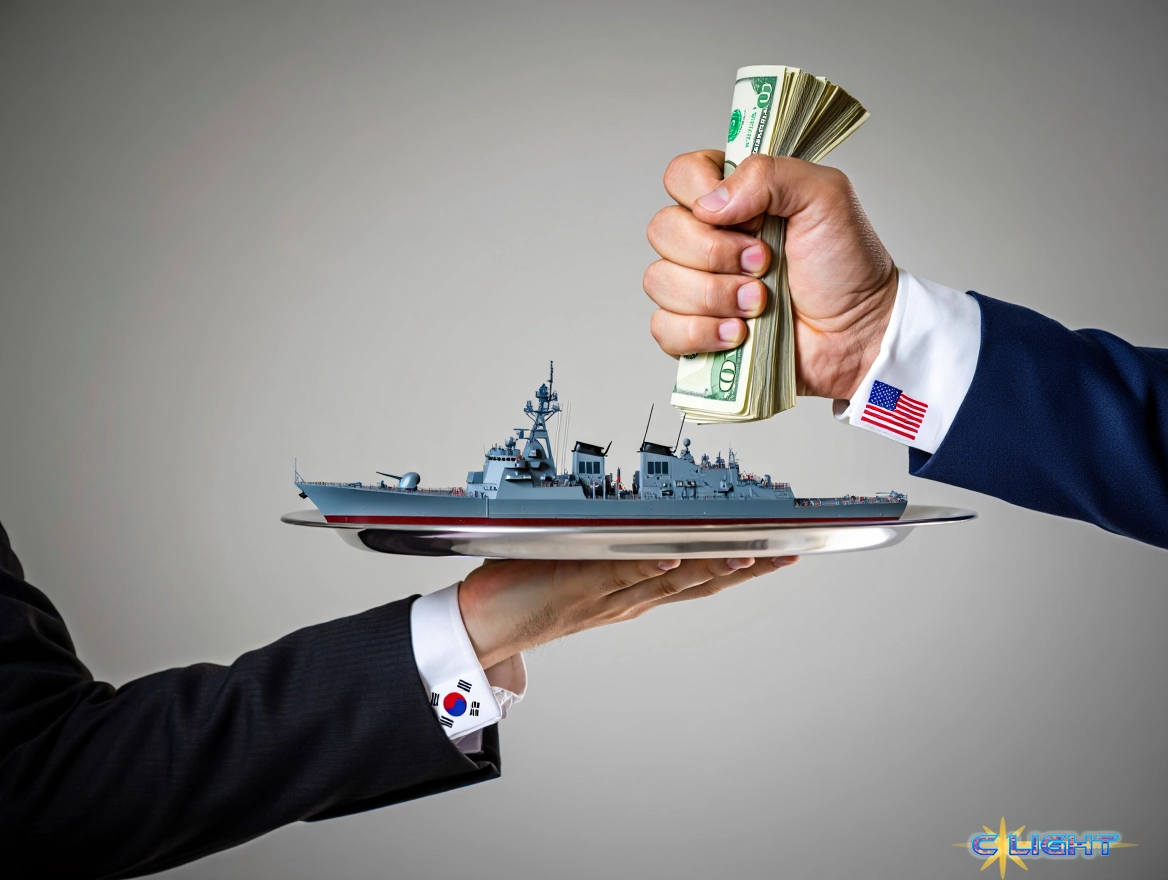5 minutes read time.
When South Korean President Lee Jae Myung arrives at the White House on Monday, he will not be greeted as a partner in a seven-decade-old alliance, but as a mark in a high-stakes shakedown. The summit is the starkest example yet of the Felonious Punk administration’s foreign policy doctrine, a transactional, coercive approach that has replaced shared values with a brutal, “Pay-to-play” system. For South Korea, a nation whose security and economic stability have long been intertwined with the United States, this is a dangerous and potentially devastating no-win situation. The whole mess is reminiscent of the AC/DC song, “Dirty Deeds Done Dirt Cheap,” except there is nothing cheap about the price of admission to the Felonious Punk’s new world order. It is a world where even the most steadfast allies are discovering that decades of loyalty are worthless, and the only currency that matters is cash.
The Price of Admission: A Multi-Billion Dollar Shakedown
The list of demands facing President Lee is less a diplomatic agenda and more an extortionist’s note. The centerpiece is a vaguely defined $350 billion investment fund, which the Felonious Punk has publicly claimed he will personally direct, with 90% of the profits flowing back to the United States. This is not a partnership; it is a demand for a political slush fund, a concept so corrupt that South Korean officials have been scrambling to reframe it as a series of loan guarantees, not a direct equity transfer. As if that were not enough, the price of admission to the Oval Office also appears to include an expectation of another $150 billion in new, private investment announcements from the South Korean corporate giants like Samsung and Hyundai, who are accompanying their president on the trip.
The shakedown extends to every facet of the relationship. President Lee is under immense pressure to sacrifice his own country’s politically sensitive agricultural markets, opening them up to American beef and rice in exchange for a reduction in the punishing tariffs the administration has slapped on South Korean cars and semiconductors. The entire security alliance, which has deterred North Korean aggression for 70 years and includes the presence of 28,500 American troops, has been reframed in the crudest possible terms. The Felonious Punk has dismissed South Korea as a “money machine” that is “free-riding” on American protection, demanding that Seoul increase its annual contribution for the upkeep of U.S. troops to a staggering $10 billion—more than nine times the current level.
The “MASGA” Gambit: A Strategy of Appeasement
Faced with this barrage of demands, the South Korean government has been forced into a strategy of desperate appeasement, attempting to manage the personality of the American president rather than engaging in a traditional policy negotiation. In a telling piece of color, President Lee admitted to reading “The Art of the Deal” on his flight to Washington, a clear sign that he understands he is dealing not with a statesman, but with a real estate developer.
Seoul’s primary piece of leverage, their “gift” to the president, is a plan they have cynically and brilliantly dubbed the “Make American Shipbuilding Great Again” (MASGA) project. Recognizing the Felonious Punk’s obsession with revitalizing the moribund U.S. shipbuilding industry to compete with China, South Korea, the world’s second-largest shipbuilder, is offering its expertise and investment. The plan includes a $150 billion fund for shipbuilding cooperation and the expansion of U.S. shipyards, a model already underway in Philadelphia, where a South Korean company has invested $100 million. The level of detail in this charm offensive is remarkable, extending even to the commissioning of custom-made red “MASGA” hats from a factory in Seoul, a clear and almost pathetic attempt to appeal to the Felonious Punk’s ego.
The Existential Threat: “Strategic Flexibility” and the Nuclear Option
Beneath the surface of this transactional dispute over tariffs and investment lies a far more dangerous and existential crisis. The administration is demanding that Seoul grant the U.S. military “strategic flexibility”—the right to freely use its troops and bases in South Korea in a potential conflict with China over Taiwan. For South Korea, this is an impossible demand. It would not only drag them into a catastrophic war with their largest trading partner, but it would also leave them dangerously exposed to a simultaneous attack from a nuclear-armed North Korea.

This fundamental disagreement has shattered the foundation of trust in the seven-decade-old alliance. The fear that the U.S. is no longer a reliable protector has become so profound that, in a stunning development, recent polls show that a majority of South Korean citizens now support their country developing its own nuclear weapons. This is the ultimate consequence of the administration’s “Pay-to-play” foreign policy: a key ally, feeling abandoned and exposed, is now contemplating a move that would radically destabilize the entire Indo-Pacific region.
The New Reality of American Alliances
The summit in Washington is a stark and painful illustration of the new reality for America’s allies. The old promises and guarantees are gone, replaced by a brutal, transactional system where loyalty is meaningless and tribute is everything. President Lee is trapped, forced to choose between economic punishment, strategic abandonment, and being dragged into a catastrophic war. His predicament is a warning to every other nation that has long relied on the U.S. security umbrella. In the world of the Felonious Punk, there are no partners, only payers. The dirty deeds are being done, and for America’s allies, the price is becoming unbearably high.
Discover more from Clight Morning Analysis
Subscribe to get the latest posts sent to your email.










